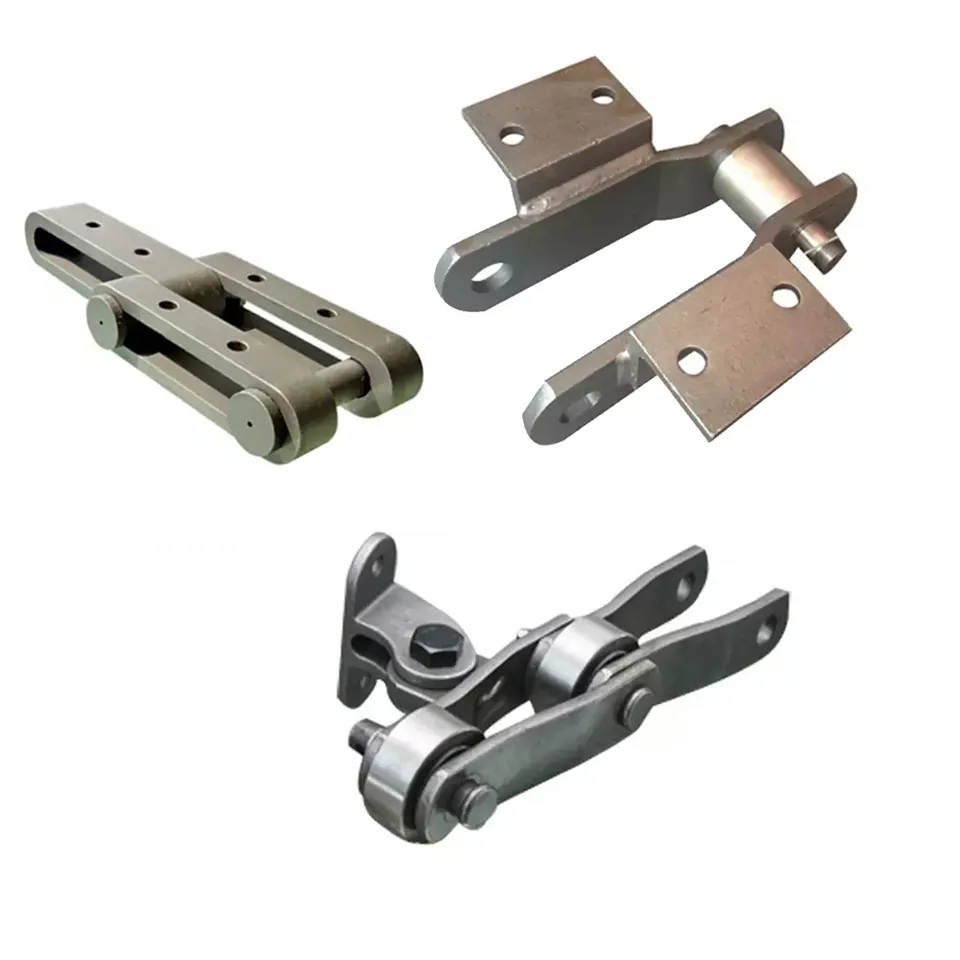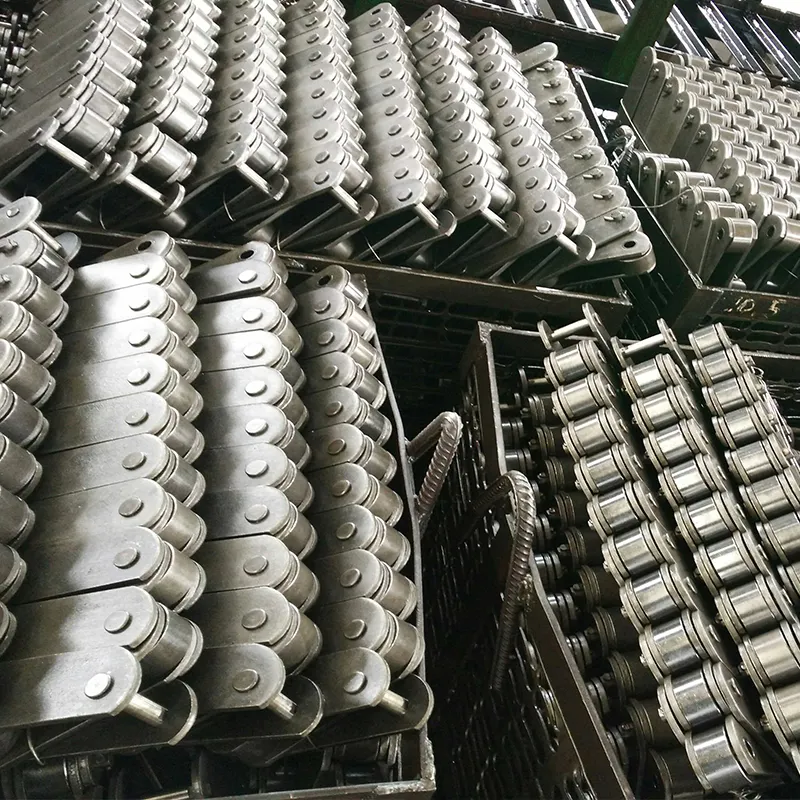Product Description
Palm Oil Mills chain
palm oil conveyor roller chain, coconut palm oil chain,foods containing palm oil Chain,organic palm kernel oil chain,Oil Palm Plant Chain,Palm oil chain P101.6F2, P152F14, P152F17
Meet or exceed DIN, ANSI, ISO, BS, JS standard, and our chains stand up to the toughest working environments with years of trouble-free performance.
We can design and manufacture almost any solution for power transmission problems. We offer quality, reliable products that perform consistently under the harshest conditions. Our products are competitively priced, readily available and deliver on time, which means you get what you need, when you need it.
Sourcing from us brings you profit, and your OEM/ODM items are always welcomed, looking CHINAMFG to establish CHINAMFG business relations with you in the near future.
General Standard for Roller Chain:
ROLLER
Solid Roller
Material 1035, 1045 or 1050
Through harden with surface and core 40-45HRC
Shot peening per the spec
BUSHING
Solid or Split Bushing per the spec
Material 1019M or 1571
Case harden(Carburized) 89HR 15Minimum
Hardness total case depth per the spec
CASE HARDENED PIN
Material 10B21 fine grain, 4118 or 8620
Case harden(Carburized) 89HR 15Minimum
Hardness total case depth per the spec
PLATE(Connectors, Links and Sides )
Material 1045 or 1050
Through harden with surface and core 39-45HRC
| P | P | d1(max) | b1(min) | Pt | N | N | h2(max) | Q | Q | Q | |
| in | mm | mm | mm | mm | mm | KN | KN | KN | |||
| 60 | 3/4″ | 19.05 | 11.91 | 12.70 | 22.78 | 1099 | 1833 | 18.08 | 31.27 | 62.54 | 93.81 |
| 80 | 1″ | 25.40 | 15.87 | 15.88 | 29.29 | 1944 | 3238 | 24.13 | 55.60 | 111.20 | 166.80 |
| 100 | 11/4″ | 31.75 | 19.05 | 19.05 | 35.76 | 2825 | 4715 | 30.18 | 86.84 | 173.68 | 260.52 |
| 120 | 11/2″ | 38.10 | 22.22 | 25.40 | 45.44 | 3821 | 6361 | 36.20 | 125.10 | 250.20 | 375.30 |
| 140 | 13/4″ | 44.45 | 25.4 | 25.40 | 48.87 | 4982 | 8363 | 42.24 | 170.27 | 340.54 | 510.81 |
| 160 | 2″ | 50.80 | 28.57 | 31.75 | 58.55 | 6316 | 10542 | 48.26 | 222.40 | 444.80 | 667.20 |
| 180 | 21/4″ | 57.15 | 35.71 | 35.71 | 65.84 | 9430 | 15747 | 54.31 | 281.57 | 563.14 | 844.71 |
| 200 | 21/2″ | 63.50 | 39.67 | 38.10 | 71.55 | 12188 | 2571 | 60.33 | 347.41 | 694.82 | 1571.23 |
| 240 | 3″ | 76.20 | 47.62 | 47.62 | 87.83 | 15747 | 23931 | 72.39 | 500.40 | 1000.80 | 1501.30 |
/* March 10, 2571 17:59:20 */!function(){function s(e,r){var a,o={};try{e&&e.split(“,”).forEach(function(e,t){e&&(a=e.match(/(.*?):(.*)$/))&&1
| Usage: | Transmission Chain, Conveyor Chain |
|---|---|
| Material: | Alloy |
| Surface Treatment: | Oil Blooming |
| Feature: | Heat Resistant |
| Chain Size: | 1/2"*11/128" |
| Structure: | Roller Chain |
| Samples: |
US$ 60/Piece
1 Piece(Min.Order) | |
|---|
| Customization: |
Available
| Customized Request |
|---|
How do mill chains handle misalignment between sprockets in conveyor systems?
Mill chains are designed to handle moderate misalignment between sprockets in conveyor systems. Here’s how they manage misalignment effectively:
Flexible Construction:
Mill chains are built with a flexible construction that allows them to accommodate slight misalignment between sprockets. The chain links and pins have some degree of movement, which helps in absorbing minor misalignment without causing excessive wear or stress on the chain components.
Side Bow Effect:
Mill chains exhibit a phenomenon known as the “side bow” effect, which allows them to adapt to misalignment. The side bow effect refers to the lateral movement of the chain as it wraps around the sprocket. This lateral movement helps the chain adjust to the sprocket’s position, even if it is slightly misaligned.
Sprocket Tooth Design:
The shape of the sprocket teeth can also influence how well the chain handles misalignment. Sprockets with properly designed teeth, such as a standard roller chain sprocket, can aid in reducing the impact of misalignment on the chain’s performance.
Regular Maintenance:
To ensure that mill chains continue to handle misalignment effectively, regular maintenance is essential. Periodic inspections and lubrication can help identify and rectify any misalignment issues, preventing excessive wear and potential chain failure.
Limitations:
While mill chains can tolerate some misalignment, excessive misalignment should be avoided. Prolonged and severe misalignment can lead to accelerated wear and reduce the chain’s overall lifespan. In cases where misalignment is significant, it is crucial to address the root cause of the misalignment and make the necessary adjustments to prevent further chain damage.
Overall, mill chains’ ability to handle misalignment in conveyor systems makes them suitable for applications where minor sprocket misalignment can occur due to system variations or environmental factors.
Can mill chains be used in material handling systems in recycling facilities?
Yes, mill chains can be used in material handling systems in recycling facilities. Recycling facilities often handle various types of materials, and mill chains are versatile and durable enough to handle the demands of recycling operations. Here’s how mill chains are suitable for material handling in recycling facilities:
1. Strength and Durability: Mill chains are designed to withstand heavy loads and are made from robust materials such as alloy steel, making them suitable for handling bulk materials and recyclables.
2. Versatility: Mill chains are available in different sizes and configurations, making them adaptable to different material handling needs in recycling facilities.
3. Low Maintenance: Mill chains typically require minimal maintenance, reducing downtime and ensuring continuous operation in busy recycling environments.
4. Resistant to Abrasion: In recycling facilities, materials may contain abrasive components. Mill chains are designed to resist abrasion, ensuring longer service life even in harsh conditions.
5. Handling Various Materials: Mill chains can handle a wide range of materials, including metals, plastics, paper, and other recyclables, making them suitable for diverse recycling applications.
6. Efficient Material Transfer: With proper design and installation, mill chains facilitate smooth and efficient material transfer within recycling systems.
7. Customization: Mill chains can be customized to suit specific material handling requirements in recycling facilities, ensuring optimal performance.
8. Environmental Considerations: Some mill chains are available with eco-friendly features, such as using recycled materials or environmentally friendly lubricants, aligning with the sustainability goals of recycling facilities.
Overall, mill chains are a reliable and effective solution for material handling systems in recycling facilities, contributing to the efficient processing of recyclable materials and supporting sustainable waste management practices.
Can mill chains be used in the mining and mineral processing industries?
Yes, mill chains are commonly used in the mining and mineral processing industries. These chains are designed to handle heavy loads and harsh operating conditions, making them well-suited for various applications in this sector. Here’s how mill chains are utilized in mining and mineral processing:
1. Material Handling: In mining operations, mill chains are used for material handling tasks such as transporting ores, rocks, and other raw materials. They are often employed in conveyor systems to move bulk materials from one location to another efficiently and reliably.
2. Crushing and Grinding: Mill chains play a crucial role in the crushing and grinding processes, where large chunks of minerals or ores are broken down into smaller particles for further processing. These chains are used in crushing machines and ball mills to ensure the smooth movement of materials throughout the equipment.
3. Agglomeration: Mill chains are used in agglomeration processes, where fine particles are combined to form larger particles or pellets. These chains are vital for maintaining the integrity of the agglomerates and ensuring proper handling during the agglomeration process.
4. Heap Leaching: In heap leaching operations, mill chains are used to stack and reclaim heaps of crushed ore, allowing for efficient leaching of valuable minerals from the ore.
5. Tailings Management: Mill chains are also used in tailings management systems, where they assist in the transportation and disposal of tailings, which are the waste materials produced during mineral processing.
6. Robust and Durable: Mining and mineral processing operations demand equipment that can withstand heavy loads, abrasion, and harsh environments. Mill chains are designed with these factors in mind, ensuring their durability and reliability even in challenging conditions.
Overall, mill chains are a critical component in the mining and mineral processing industries, contributing to the efficiency and productivity of various processes involved in extracting and processing valuable minerals.
editor by CX 2024-01-11



